 New York : Safety by City
New York : Safety by City
- Albany
- Binghamton
- Brooklyn
- Buffalo
- Cooperstown
- Elmira
- Fair Haven
- Greenport Village
- Ithaca
- Jamestown
- Lake George
- Lake Placid
- Lewisboro
- Long Island
- Manhattan
- Mt Vernon
- New Paltz
- New Rochelle
- New York City
- Niagara Falls
- Oswego
- Poughkeepsie
- Queens
- Rochester
- Rye
- Saranac Lake
- Saratoga Springs
- Schenectady
- Seneca Falls
- Shelter Island
- Sleepy Hollow
- Syracuse
- Utica
- Watertown
- Watkins Glen
- White Plains
- Yonkers
When people think about New York City, they conjure visions of Times Square, Central Park, and other Manhattan landmarks.
However, Manhattan is just one of NYC’s five vacation-worthy boroughs.
Just a short bus or subway ride across the East River, Queens is a wonderful and eclectic destination of its own, offering world-class culture, food, entertainment, and more.
From Astoria’s Museum of the Moving Image to Citi Field, home of MLB’s New York Mets, to the site of the 1964 World’s Fair, there is something to interest everyone in Queens.
At almost 110 square miles, Queens is the largest borough, and its diverse neighborhoods are home to more than 2.4 million residents.
While Queens is generally a safe place to visit, there are some things to consider before planning a trip.
Warnings & Dangers in Queens

OVERALL RISK: LOW
New York City is ranked the 7th safest city in America, and Queens is rated as the second safest borough, behind only Staten Island. Due to its sprawling size and variety of neighborhoods, there are certainly some areas to avoid, but these are largely isolated residential locations that visitors can easily steer clear of. Areas of Queens most frequented by tourists are relatively safe compared to other major cities.

TRANSPORT & TAXIS RISK: MEDIUM
Queens offers a variety of public transportation, including the Metropolitan Transit Authority, which is NYC’s subway and bus system, several branches of the Long Island Railroad, and the NYC Ferry. Most forms of public transportation here are safe but can be confusing. Be sure to refer to a map before boarding, and don’t be afraid to ask transit employees for help or directions.

PICKPOCKETS RISK: LOW
Much of Queens is somewhat residential and less crowded than Manhattan. This means that there’s less risk of being stuck in a dense crowd of people where it’s easy for pickpockets to work. However, Queens is still a major city, and you should practice basic safety measures, such as keeping your wallet, phone, and valuables safely stored away in an interior clothing pocket, or zipped bag.

NATURAL DISASTERS RISK: LOW
There is an extremely low risk of any natural disasters occurring during your trip to Queens. There can be winter snowstorms, but the city is adept at road and sidewalk treatment, snow removal, and providing safe and reliable transportation, even during a blizzard. Coastal neighborhoods can be affected by the rare hurricane, but this is very unlikely. The last major storm to impact Queens was Hurricane Sandy in 2012.

MUGGING RISK: MEDIUM
Many areas of Queens carry a low risk of violent crimes such as mugging. However, there are neighborhoods such as Jamaica, Far Rockaway, and Corona where they’re more common. If possible, avoid these spots. In general, regardless of the neighborhood, it’s safest to stick to busy main roads and avoid traveling through deserted areas at night.

TERRORISM RISK: MEDIUM
There’s no avoiding the fact that, due to its notoriety as one of the world’s largest cities, New York will always be somewhat at risk of a terrorist attack. However, the NYPD’s Counterterrorism Bureau has made New York City as a whole, and Queens, specifically, one of the safest big cities to visit. There are currently no credible or specific terrorist threats to Queens.

SCAMS RISK: MEDIUM
Scams are possible in Queens, but they’re easy to avoid for travelers who know what to look for. Refrain from buying items from street vendors. They’re often poor quality, stolen, or counterfeit. If visiting Citi Field, only purchase tickets from a verified source. Tickets sold on the street are likely to be overpriced and/or fake. When traveling by cab, be sure the meter is running. A common scam is to tell tourists the meter is broken, and then overcharge for the ride.

WOMEN TRAVELERS RISK: LOW
Queens isn’t any more dangerous to women travelers than other major cities. Still, female visitors should practice basic safety measures. Never get on an empty subway car. Avoid deserted neighborhoods, especially after dark. Hold on to drinks at bars and clubs so they can’t be tampered with. Don’t, under any circumstances, let a stranger take you anywhere alone.

TAP WATER RISK: LOW
New York City prides itself on having some of the best tap water in the world. Queens tap water is unfiltered, but daily testing and treatment keep it pleasant tasting and safe to drink. Bottle fillers can be found in many public locations, making it easy to refill your water bottle throughout the day.
Safest Places to Visit in Queens
The choices are endless when it comes to safe and exciting places to visit in Queens.
Film and television fans should check out the Museum of The Moving Image in Astoria.
Their permanent Jim Henson exhibit is fun and engaging for children and Muppet enthusiasts of all ages.
Sports fans can tour Citi Field or take in a New York Mets game.
The subway series between the Mets and the Yankees is especially fun.
While you’re there, visit the adjacent Flushing Meadows-Corona Park, the site of the 1964 World’s Fair.
In the summer, sun worshipers can visit Rockaway Beach, and enjoy the waves of the Atlantic Ocean.
Ambitious visitors can even take surfing lessons.
For nature lovers, Gantry Plaza State Park in Long Island City is the perfect place to enjoy a variety of foliage, set against an amazing view of the Manhattan skyline.
Places to Avoid in Queens
Some neighborhoods to avoid, if possible, are Corona, the south side of Jamaica, the Rochdale and Queensbridge housing projects, and the south side of Ozone Park.
If traveling through these neighborhoods, try to do so during the day, and stick to the main throughways.
In general, it’s safest to avoid deserted or very residential neighborhoods, especially once it gets dark.
Avoid city parks at night.
Never board an empty subway car.
Opportunistic criminals often target people who are alone in subway cars.
Protect yourself by making sure there are other people in a subway car before entering.
If this isn’t possible, wait for the next train to arrive.
If you are alone on a subway platform and feel unsafe, wait near a manned MTA booth until you hear a train arriving.
If the booths are unmanned, consider taking a bus, rideshare, or taxi to reach your destination.
Safety Tips for Traveling to Queens
- Research your location. Queens is extremely spread out, which means it’s important to research your location before booking a hotel or lodging. Make sure you’re in a lively and safe neighborhood with reliable transportation options.
- Avoid street vendors. Street vendors are unregulated and often sell stolen or counterfeit items. Don’t buy from these sellers. (Don’t be afraid to visit food trucks though; Queens has some amazing street food!)
- Don’t visit public parks after dark. When the sun goes down, city parks can quickly transition from bustling and picturesque hangouts to dangerously deserted areas. Visit the parks if you can, but plan to go during the day.
- Steer clear of empty subway cars. It’s never safe to be the only person in a subway car. This singles you out as a potential target for opportunistic criminals. Always make sure there are at least a handful of people in a subway car before boarding. If the whole train is empty, wait for the next one.
- Avoid unmarked cars. If an unmarked black car pulls over to offer you a ride, decline. While some of these are legitimate car services, many are unregulated drivers, which means they can charge any price they want, and there’s no guarantee you’ll safely reach your destination. It’s hard, if not impossible, to differentiate the legitimate drivers from the rest, so it’s best to stay away from all of them.
- Stay away from isolated neighborhoods. In some highly residential and isolated neighborhoods, tourists stand out as potential crime targets. Stay away from very quiet neighborhoods, lack retail areas, or are known to be unsafe, such as Jamaica, Corona, and Ozone Park.
- Stick to main streets. Most tourist destinations will be on the main road or in a bustling commercial district. Unless you’re traveling with someone who knows the area, stay in these busier areas, to avoid getting lost in a potentially dangerous neighborhood.
- Protect your valuables. Use hotel safes to lock up anything you don’t need to bring with you. Carry a minimal amount of cash. Make sure your wallet and any important documents are tucked away in an inner pocket or zipped bag.
- Seek out the NYPD if you need help. If you’re lost or need assistance, try to seek out an NYPD officer. Uniformed officers are visible in most neighborhoods and are generally more than willing to help.
- Be attentive. As safe as it is, Queens is a major city, which means crime does sometimes happen. Throughout your visit, it’s important to remain alert and observant of your surroundings. When entering a building for the first time, identify the closest exits. Make a note of anyone acting unusually. If you see something suspicious, report it to law enforcement.
So... How Safe Is Queens Really?
By nature, Queens will always have a higher crime rate than small suburban towns, due to its urban setting and large population
However, Queens is very safe compared to other major cities.
Since the turn of the 21st century, crime rates have been falling in Queens and the entire city of New York.
This is a result of enhanced counterterrorism efforts and a stronger police presence throughout the city.
Uncharacteristically, there was a somewhat substantial rise in crime rates across all five boroughs in 2021.
This may be related to difficulties caused by the COVID-19 pandemic, which was especially devastating to New York City, leaving many people stuck at home and out of work.
City officials are optimistic that as the city crawls back towards normalcy, crime rates will return to their previous lower levels.
Even taking the uptick in crime into account, Queens is still a very safe place to visit.
Much of the borough has a visible and well-regulated police presence, and the risk of violent crime against tourists remains low.
Natural disasters are exceedingly uncommon, and Queens isn’t currently the target of any credible terrorist threats.
While it’s possible to become a victim of a scam or pickpocketing, well-prepared visitors can drastically lower their risk by taking common-sense safety measures.
How Does Queens Compare?
| City | Safety Index |
|---|---|
| Queens | 73 |
| New Orleans | 57 |
| Baltimore | 56 |
| Boston | 67 |
| Washington DC | 56 |
| New York City | 67 |
| Detroit | 56 |
| Niagara Falls (Canada) | 87 |
| Calgary (Canada) | 82 |
| Buenos Aires (Argentina) | 60 |
| Vancouver (Canada) | 82 |
| Cordoba (Argentina) | 61 |
| Toronto (Canada) | 81 |
Useful Information

Visas
Visas aren’t required for American citizens. Visitors from abroad can consult the U.S. Department of State to see if their country of citizenship is a part of the U.S. Visa Waiver Program. Visitors from these 39 countries can visit the United States for up to 90 days without a visa. Travelers from other countries may require a visa.

Currency
The currency of the United States, including Queens, is the U.S. dollar. Vacationers can choose to exchange currency at home before traveling to New York. Otherwise, Queens has a huge number of currency conversion shops. Most major American banks also offer currency exchange services.

Weather
Situated in a continental climate zone, Queens has four distinct seasons. During the hot and humid summer, average temperatures reach 85 degrees. Cold, often snowy winters bring with them average lows of 24 degrees. Spring, although sometimes rainy, features milder temperatures and beautiful spring blooms. Autumn is a wonderful time to experience brisk weather and breathtaking fall foliage.

Airports
Queens is home to two major airports. John F. Kennedy International Airport (JFK) is a large and bustling airport catering to international and domestic visitors alike. The much smaller LaGuardia Airport (LGA) is a quieter option for domestic travelers.

Travel Insurance
Travel insurance can help protect your trip if it has to be canceled unexpectedly. Different companies offer a wide variety of insurance plans at several price points. Make sure to research your options before deciding what plan, if any, is right for you.
Queens Weather Averages (Temperatures)
Average High/Low Temperature
| Temperature / Month | Jan | Feb | Mar | Apr | May | Jun | Jul | Aug | Sep | Oct | Nov | Dec |
|---|---|---|---|---|---|---|---|---|---|---|---|---|
| High °C | 5 | 6 | 11 | 16 | 21 | 27 | 29 | 29 | 25 | 19 | 14 | 8 |
| Low °C | -4 | -3 | 1 | 6 | 11 | 17 | 20 | 20 | 16 | 10 | 4 | 0 |
| High °F | 41 | 43 | 52 | 61 | 70 | 81 | 84 | 84 | 77 | 66 | 57 | 46 |
| Low °F | 25 | 27 | 34 | 43 | 52 | 63 | 68 | 68 | 61 | 50 | 39 | 32 |

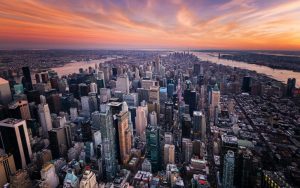
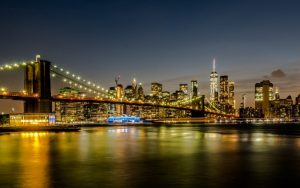
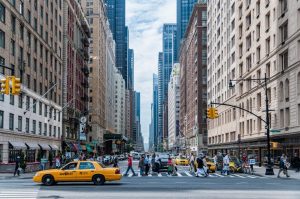
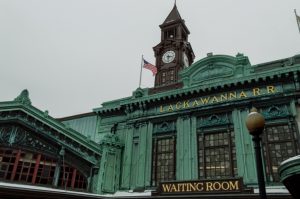
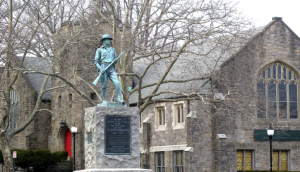
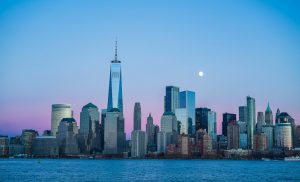





A far cry from what you might expect
I am going to be brutally honest and admit I thought my time in Queens would be miserable – went there to meet my fiance’s family. I couldn’t be more wrong! The things you see on tv, both news and movies, were extremely different from what I got to experiment.
Stay alert and keep to yourself, especially if you’re traveling solo.
With Manhattan only a train ride away you can expand your visit, depending on how much time you want to spend in NYC. Also, can you believe Queens is rated safer than Manhattan?!
Being alert and keeping a low profile when going through areas you feel weird should be general behavior. My fiance knew what to visit, when to visit, and what’s a no no, even if you’re a resident and I find this is similar to other places, even Paris. Yes, Paris is lovely and all but some touristy hotspots are a magnet for pickpockets. As you would expect, Rochdale, which is a neighborhood that houses a lot of projects, is not the place you want to visit by foot and get to know the local scene because there’s very little to experience.
Fiance’s verdict: much safer than in the 90’s, people are less territorial but this doesn’t mean you have to act like you’re in a resort, watch yourself, don’t be a fool.
The NYC subway system has a limited range so we weren’t able to get through all of it by subway so we’ve used uber instead.
My verdict: without having something to compare it with other than hearsay from the TV, I was actually impressed with what Queens has to offer. Considering we will be coming back quite a lot now, I need to ride those forums and see where I can find the coolest restaurants and breweries. I’m all about experimenting with the foodie scene and there’s a lot to experiment here.
Safe Area, Coming From Resident
I’ve lived in queens my whole life and as long as you exercise common sense (as always) you would be perfectly fine. Just two things I would like to mention, lately there has been an uptick in nighttime crimes, so remain vigilant at night. Also, the traffic on the LIE (or I-495, us locals just call it the LIE) is TERRIBLE and accidents are an extremely common event on there. Drive carefully on that road as on any other road in an area where LIE traffic may feed into it. Anyways thank you for reading sort of pointless but yeah 🙂
Ideal oasis unless you hate diversity or wanna party
Unless you are in the poor urban areas like the scary ones mentioned, Queens is super convenient, relatively affordable (unless compared to SI or BX), quiet, and VERY safe. More families and immigrants . Young ppl pay more to move where other young ppl are, despite the commute. Their loss! West and north of Woodside are younger (white) people in LIC and Astoria. Anything west of Corona is safe and Jackson Heights is a bustling area with Latinos and Indian. Too chaotic for me but lots of trains. Beware of massage ‘parlors’ in JH